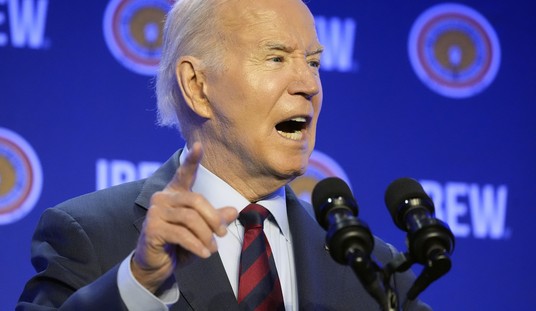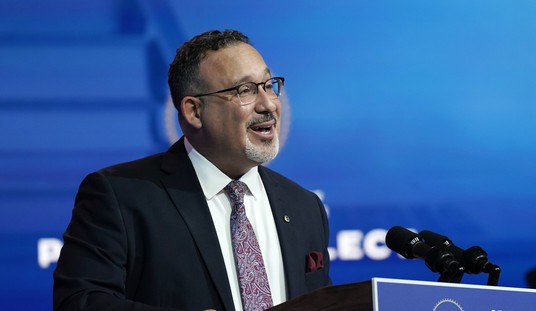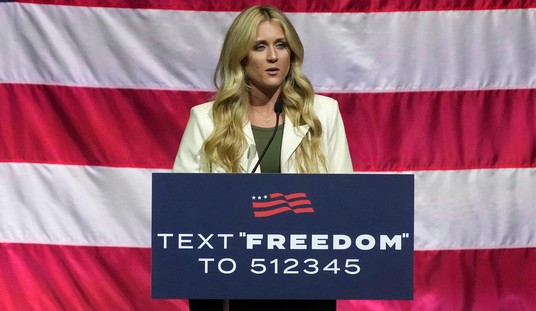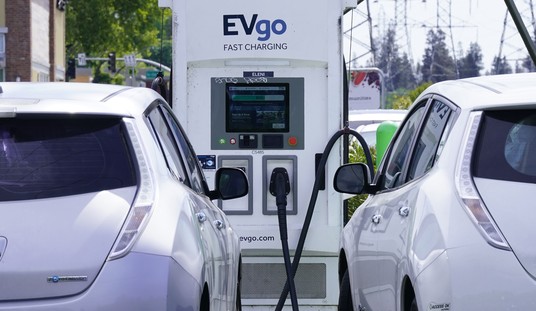Former Utah Governor and current Presidential candidate Jon Huntsman took the time on Friday to sit down with me and answer some questions on his views. You can hear the entire audio of the interview by clicking below, or I have generated a rough transcript which you can find below the fold.
I will admit to being impressed by Governor Huntsman, who I had largely written off earlier in the campaign. As a matter of presentation, he seems to come off better on audio than video for some reason. In any event, he answered my questions candidly and with a bare minimum of politician-speak. He refused an opportunity to backtrack on some of the earlier comments attributed to his campaign, but I think most readers will find that his positions are more conservative than they would expect.
For instance, Huntsman is a strong and unequivocal pro-lifer. He stated in this interview that he would veto any budget that included any funding for Planned Parenthood, even if it was otherwise a budget he would have preferred (this was one of the most interesting exchanges in the interview, in which Huntsman seemed to thoughtfully consider the implications of the policy he favored in Utah). He favors a flat tax, but his proposal makes more political sense than most because it seeks to accomplish a truly flat tax level in incremental steps. Huntsman speaks with some authority on this, having successfully shepherded through a flat tax in Utah. Although he favored civil unions in Utah, he favors every provision of DOMA and stated unequivocally that he would order his Solicitor General to defend its constitutionality. Although he (like Romney and Gingrich) has expressed belief in global warming, he categorically rejected cap-and-trade imposed by EPA fiat (and opposed it altogether while other countries are not signed on). He has been a strong defender of school vouchers and other conservative policies. He flat out rejected the premise that he or his campaign had ever made the strategic decision to run to Mitt Romney’s left. Unfortunately, the Governor was driving through Nebraska and our call was disconnected before I could ask him about his decision to hire John Weaver, and his refusal (to this point) to walk back many of Weaver’s inciendary comments early in the campaign. In all, I was somewhat disappointed that Huntsman did not walk back the “call me crazy” tweet and that he held fast to “no litmus test” when it came to judges, but in a sense one has to respect his refusal to pander.
Huntsman favors an interesting finreg proposal in which apparently banks that have a net worth above a certain percentage of GDP would essentially be required to purchase “too big to fail” insurance, if I am understanding his policy correctly. This is one of many areas where Huntsman exhibited that if nothing else he is willing to bring a thoughtful and interesting perspective to the race. Click the link below to listen or read below the fold.
Q: Governor Huntsman, thank you for taking the time to sit down with RedState.
A: Hey, delighted to do so, thank you for giving me the time.
Q: Well, I know that you are very busy and that you’ve got a full schedule, here, and I have a lot that I’d like to cover with you if possible, so I’d like to just kind of get down to brass tacks and start things off by giving you, I don’t know, maybe 30 or 60 seconds to kind of introduce yourself to RedState readers. As you might know, they tend to be on the fiscal and socially conservative side – and maybe tell these folks something that they may not know about you or your candidacy at this point.
A: Well, listen, I appreciate the opportunity to be here. I am in this race because what we are passing down to the next generation is not the America that I grew up in. Uh, we have watched our values, we are saddled with debt, our position in the world has been compromised, and I say I’m not going to stand around and allow the United States of America, the greatest nation that ever was, to be passed down to the next generation – I’m raising seven kids. I’ve got two boys in the military. You know, I’ll be darned if I’m going to stand around and watch the United States continue to crumble while we’ve got a great next generation coming up that wants to maintain our nation’s values and protect its goodness and to get back on, back on our feet economically.
So I’m putting forward some ideas that, uh, that I implemented and worked on as Governor, a twice-elected governor of Utah, where we took a good state and made it number one in job creation in the country. I, uh, put forward a flat tax. People said it couldn’t get done, that it was all pie in the sky. We got it done, it took us two years to do it but we got a flat tax in that state. We delivered the best environment for business anywhere in the country. Uh, we embarked on healthcare reform without a mandate, and got that done. I delivered education reform by signing the second voucher bill in the entire country. Uh, we balanced our books – I tripled the rainy day fund, and delivered the largest tax cut in the history of the state. Uh, and so, we did a lot of great things that really prove that free market economics is what is needed in order to allow a State – or, at the Federal level, a nation – to compete.
And, uh, I’m very, very concerned, about really two things that drive me in this race. Two deficits. One is an economic deficit – the 15 trillion dollars in debt that will shipwreck the next generation. It will literally make it impossible for us to be able to compete in a highly competitive world, because at 70% to GDP or 80% to GDP, you just don’t grow anymore. And I’m fearful of what lies around the bend, as I look at Japan and I look at Greece and Italy; I don’t want to go there. We’re too good as people to allow that to happen to us.
And I say the other deficit is a trust deficit that’s very real, and I think equally corrosive in this country. Because Americans no longer trust their institutions of power. They don’t trust Congress. Congress has an 8% approval rating. We all know that Congress needs term limits, but nobody wants to talk about it, and I want to lead the charge in having a national conversation in getting term limits. We all know that we’ve got to shut closed the revolving door that’s got members of Congress to file right out, become lobbyists overnight, that is complete nonsense and it adds to the cynicism that we all feel in this nation. Uh, we need to get those folks on Capitol Hill, if they’re going to get paid, to balance the budget for heaven’s sake. They’re just a few simple requirements.
So I say there’s no trust toward Congress, there’s no trust toward our current tax code. Why? Because there’s loopholes and deductions for everybody and it keeps the lobbyists going crazy on Capitol Hill, going more and more, just corrupting our tax code, and we need to [garbled] crony capitalism, which is already out of control. And I say we can fix this. We can fix it with the kind of tax reform that I have put forward. Which draws a lot from what I did as Governor, is calling for the elimination of all loopholes and deductions on the individual side; all of them. Lowers the rate, broadens the base, and simplifies. And on the business side, it’s calling for the total elimination of corporate welfare. No more deductions, no more subsidies, no more loopholes, all of it gone.
And I think that does two things for us in this economy. It levels the playing field for entrepreneurs and the creative class who think that the decks are already stacked against them. And number two, it really drains the swamp in a sense on Capitol Hill, because if there’s nothing to lobby for in terms of additional carve-outs and subsidies, there’s nothing to lobby for. And I think that is a very powerful disinfectant as it relates to really cleaning up the system.
And I say there’s no trust left in our wars abroad. You know, we’ve been at it for ten years, the war on terror. We still have a very real war to fight. That’s against terrorists, and we need to fight it vigorously in every corner of the world. But we do not need 100,000 troops in Afghanistan nation building when this nation needs so desperately to get on its feet. And we will not be able to project the values of goodness, liberty, democracy, human rights, free markets, until we fix our core. And we’re a long way from being able to get that core fixed and it must be our focus before we start gallivanting around the rest of the world.
And I say on Wall Street, there’s no trust there either, with banks that are too big to fail. There’s this implied subsidy on behalf of the taxpayers, because if one of these big banks fails, it takes everybody down. And we can’t afford to let that happen. So as President, I want to right-size these banks, I want to get them back to the size they were in the 1990s, as opposed to the size they are today. Which is, you know, the six top banks have assets that are worth about 2/3rds of our entire GDP. 9.4 trillion dollars. I say that’s a recipe for disaster, longer term.
So, Leon, we’re focused laser-like on the economic deficit, and the trust deficit. I think they go hand in hand, and both of them must be looked at and worked on aggressively.
Q: Now Governor, you’ve already mentioned one of the first things that I wanted to ask you about. You’re one of the few people in the country who’s had success implementing a flat tax. I know in a number of states, like Tennessee where I live, they have already a flat tax of zero on, as far as income tax. But you’re one of the few people that’s taken a tax that was a progressive tax and ratcheted back into a flat tax. Do you think that that sort of program would work nationally, and is that something you would push for as President?
A: Well, the step that I’m looking for, which are three, uh, three levels. Uh, 8, 14, and 23. That, I think, is a logical first step. I want to phase out loopholes and deductions, which would then allow us to raise that revenue, reinvest it in the tax code, and lower the rate in these particular areas, depending on your income. I think that’s a first step. And ultimately from that, I think you could go to a true flat tax. I think you have to do it in phases, I don’t know that you do in one fell swoop to a flat tax, but I think you get there by taking a step first. Part of the problem I have with my good friend Rick Perry’s flat tax – he’s talking about a flat tax, and I’ve talked to him about this, is that he makes it optional. And I say that’s not going to get us anywhere, because if you’re already gaming the loopholes and deductions in the current system, which most people are, then they’re going to keep gaming it. And it doesn’t move us anywhere in terms of moving from point A to point B in tax reform. I want to move from point A to point B. And I think the most realistic and doable step, uh, and I think the endorsement by the Wall Street Journal would echo this as well, when they came out and endorsed our tax reform plan, would be to move first to this level of reform, see it play out in the marketplace, see what it does, in terms of beginning to fire our engines of growth and breathing new life and confidence into the marketplace, and then see where we might grow from there.
Q. Does your tax plan include um, allowances for the fact that – one of the things that’s a frequent criticism of flat tax plans is, um, kind of I guess a regressive nature on purchases like food and grocery – things that lower income folks need to subsist. Is there any sort of allowance for that within your tax structure.
A. No, there isn’t currently. It goes to three levels immediately. You know, in negotiation, as I had when we were facing our flat tax in the State of Utah. Uh, there may be something that could be negotiated in terms of a phased-in period, for people who have the lowest income levels. But I want to get it to where it’s really a flat tax. I want to get people invested in the tax code. I wanna get, I want to broaden the base, uh, of people invested in the tax code. We need to expand our economic performance and expand our revenue base to pay down the bills and get our debt-to-GDP ratio in a healthy, uh, in a healthy area.
So I think that today, that isn’t the case. But, you know, in a negotiation with Congress, I can see how that part, for the lowest of low income, uh, might be possible.
Q. One of the things that people may not know about you is that you are actually a very strong pro-lifer, is that correct?
A. That’s correct.
Q. Now you..
A. I have been pro-life my entire career – I have two little adopted girls. One from China, one from India, who remind me every day about the beauty of life. And, uh, these little girls come from a culture where, uh, they were both abandoned – one at birth and the other at two months of age, where their mothers could have chosen otherwise. But their mothers for whatever reason chose life. And I’ll never be able to thank the mothers; I’ll never meet them. Uh, but I think about them all the time and so does my wife. And they were a couple mothers, no doubt, in a hardship position and you know, poorest of poor, in these very [under]developed countries, um, and they chose life. And they gave us life. And we now live with the life that they left for this world and these two little girls are going to go on and change the world in their own way and that, for me, is once again an example of the power of life, and how central life is to our existence here. If you believe in life, liberty, and the pursuit of happiness, which is the philosophy which I tend to filter everything through when I make a decision as Governor, when I served as Governor, it’s a very powerful thing in our lives.
As Governor I also signed legislation that drove home that point. Uh, including banning second-trimester abortions, uh, including legislation on suffering of the fetus. Uh, including developing a trigger mechanism if Roe v. Wade ever were to be overturned.
Q. What I’d like to do, if I can, is go through, I guess kind of like a lightning round of questions. I think they can fairly be answered “yes” or “no,” on where you stand on various life issues, just to kind of introduce people to where you stand on a number of things. For instance, as President, would you sign an executive order reinstating the Mexico City Policy?
A. Uh, I would go right to where Ronald Reagan was, where we would not fund abortions anywhere in this world.
Q. Okay. Uh, you of course support the Hyde Amendment, is that correct, in keeping with that?
A. That’s correct.
Q. Would you support, either by legislation or executive order, a policy stating that all hospitals receiving medical funds must allow medical personnel who object to abortion on conscience grounds to opt out of that procedure?
A. Yes.
Q. Okay. Do you support efforts to eliminate federal funding for Planned Parenthood?
A. I do, but I have to be consistent with legislation in my own state, where there was some health aspects non-abortion health related aspects of Planned Parenthood that I supported.
Q. But would you agree, I guess though, that money is the ultimate fungible asset in the world – I mean, if you’re giving money to Planned Parenthood for other things, can’t that same money that they would otherwise from their budget there be diverted to the provision of abortion?
A. I would, I would agree with that.
Q. So notwithstanding that… well, let me just put the question in a different way. Would you veto any Federal budget that contained funding for Planned Parenthood?
A. Uh, yes I would.
Q. Okay. Even if that budget was satisfactory to you in other particulars, as far as the size of the budget and so on and so forth?
A. Say that one more time? You broke up a little.
Q. Sure, sure. Even if that budget was satisfactory to you in other particulars – in other words, it didn’t contain any..
A. Okay, yes. That’s right.
Q. One of the things that has frustrated pro-lifers for a long time is that Democrat nominees for President have long been able to publicly promise that they will nominate any Supreme Court judge (sic) that would not uphold Roe v. Wade, whereas Republican nominees have I guess kind of spoken in terms of code, like, “I would nominate judges like Roberts, Scalia, or Alito,” or worse, “I would have no litmus test in terms of the judges I would support.” Can you say that you would only nominate Supreme Court judges – justices – who would vote to overturn Roe v. Wade?
A. Uh, when I interviewed for judgeships when I was Governor I did not impose a litmus test.
Q. Okay. Would you continue that policy as President?
A. Uh, I would continue that. I would seek out pro-life candidates first and foremost, but I would not, you pretty much know who those people would be, but I would not expressly impose a litmus test.
Q. Okay. You, of course, have a great amount of expertise, maybe more than anybody in the field, in issues of China. And I don’t know if you’ve seen the news report today of Christian Bale, the actor – of course, he plays Batman – was roughed up by some Chinese guards attempting to go and visit Chen Guangcheng. Have you seen the news reports about that?
A. Uh, I have, uh, not directly, but just as it flashed on the screen. I know Chen Guangcheng, I know of his case very well.
Q. What, if anything, and let me break this up into two questions. What, if anything should be done by the United States to encourage China to change its “one child” policy?
A. Well, uh, I probably did more than anybody. Uh, because my daughter Gracie was known by 1.3 billion people in China. Everybody heard her story. They knew that we had adopted her and given her life. Uh, they knew that she got to seek a great educational opportunity – a young, pretty, brilliant girl who was, I mean, it was all the time in China. I dare to say that our one act of adopting a girl, as United States Ambassador to China, in many minds – and this would be impossible to quantify – but I tell you, may have had more of an impact in that country, one thing, than all the speeches combined of U.S. government officials over the years.
Q. Okay. One thing that many people may not know is that India, where your other daughter was adopted from, certain parts of India are contemplating adopting a two child policy. What if anything can or should the United States do about that?
A. Well, I would just offer the same thing, and that is highlighting the beauty and the value of life. And there’s nothing more powerful than leading by example. And when you can lead by example by showing the kind of life that these little girls live when they are allowed into this world, I think that’s a very powerful manifestation all by itself.
Q. You as Governor were broadly supportive of gay marriage, is that correct?
A. I was supportive of civil unions.
Q. Okay. Do you support the Defense of Marriage Act on the federal level?
A. Yes, I am for the Defense of Marriage Act, I think that it’s an important safeguard for states if they choose to go in a direction that is different from another state that chooses gay marriage.
Q. Would you order your Solicitor General to defend the constitutionality of every provision of the Defense of Marriage Act if you were elected President.
A. Sure.
Q. Would you veto any legislative attempt to overturn any portion of the Defense of Marriage Act?
A. Uh, I’m not sure. I’d have to look at that.
Q. Okay. Um, as we wrap up here, I think that a lot of folks as the primary electorate has kind of moved from candidate to candidate trying to see who it is that they are going to support, I think many people are kind of coming around at least to take a second look at your candidacy and I want to ask you about a few things that happened kind of towards the beginning, um, and see if you have anything different to say maybe, I guess, given all the things that have gone on since. Do you think that you misjudged how the primary electorate would receive your taking a job in the Obama administration as ambassador to China?
A. Uh, you know, I didn’t really give it any thought, because, serving my country first and foremost, is always part of who I am and always will be part of who I am. And if asked to step up and serve your country during a time of need, during a time of war and economic hardship, uh, that’s all that matters. And, uh, if for whatever reason people want to hold that against me, that’s okay. Uh, I’m gonna stand true to who I am and putting my country first and foremost. And I would be a horrible example for my two sons in the Navy if I didn’t choose to do that.
Q. Okay, um, you would agree of course that you can also serve your country as serving as the Governor of Utah, correct?
A. Of course.
Q. And in fact, numerous state governors have been I guess in the forefront of the legal fight here at home against Obamacare and against its implementation. Do you have any regret at all that you haven’t been able to stay in your post as Governor and to help with that fight?
A. I was asked to serve my country. Ah, I have no regrets about serving in a position for which I was very well qualified, uh, at a very sensitive time in the relationship, uh, and I don’t second guess that at all.
Q. Okay. As we’ve talked here today, and as I’ve talked with people who I know on your campaign, you know, I’m impressed with the extent to which your views and mine – and I’m a very strong social conservative – line up on so many issues. And I guess the question that I have is that, um, why haven’t you done more to sell yourself to social conservatives?
A. I think that because I crossed a partisan line, many of them glossed right over me at the beginning, and they wanted other candidates, and now they’re coming around as you say for a legitimate first look, maybe a second look in some cases, uh, and I think that’s very good news for us as we stare down the weeks ahead. But I think that probably had to do, uh, that was probably more of a cause of it that anything else as I reflect on it. Because I am who I am and I’m also not one who’s going to sign pledges; I don’t believe in pledges. Everyone else was running to sign pledges, so, running to pander to various groups, uh, during the straw poll time in Iowa and Florida. I wouldn’t do that. And some people may have held that against me at the time, and now they’re coming back and they’re saying, “Maybe he’s genuine and actually authentic, and he wasn’t willing to sign those pledges and everyone else did.” They spiked, they left, they’ve come down again. And, uh, I’m sort of thinking this slow, steady, substantive rise, it looks like may be durable longer-term.
Q. Would you agree that you governed well to Mitt Romney’s right, when you were the governor of Utah?
A. Say that one more time?
Q. Would you agree that you governed well to Mitt Romney’s right?
A. Oh, there’s no question about that. Uh, I didn’t raise taxes, I didn’t deliver health care reform with a mandate. I was always pro-life. Uh, we delivered school choice legislation, I think, uh, we battled, we delivered the largest tax cut in the history of the state – I mean, in every single area, I think you would find that you know, that we were most likely to his right.
Q. I guess one of the things that causes a lot of people consternation is that we, as the GOP primary electorate were introduced to your campaign, we were told, especially by folks in the media, that you were making a deliberate strategic decision to run to Mitt Romney’s left. Has that at any time been accurate?
A. No. That was – that was never a strategic decision. I think that’s concocted by some and I think they’re looking now that maybe – looking at it, and, uh, concluding for themselves that they may have misinterpreted who I am as an individual because I crossed a partisan line. And now they’re coming back around and probably trying to, uh, explain the reason why they didn’t give us a good look in the beginning. And that may be one interpretation, but that was never, uh, that was never an explicit policy on our part to run to Mitt Romney’s left.
Q. You had a tweet, I guess at the beginning of your campaign that said something to the effect of, that you believed the scientists on global warming, you know, “call me crazy,” I’m sure you probably remember the one I’m talking about. Would you retract that tweet if you had the opportunity now?
A. Uh, no, I wouldn’t redo anything that I’ve done. I, you know, I’ve made decisions at the time based on issues that were playing out and, uh, I don’t play the woulda, shoulda, coulda game. Uh, I make decisions based on discussions, or policy issues that were being deliberated at the time, and made a decision based on that. And so, I’ll let history decide whether that was a good thing to do, but it was from my heart. It was from who I am, and therefore I don’t regret it.
Q. With respect to how you would govern as President, in respect to global warming, would you permit your EPA to implement a cap-and-trade policy without authorization from Congress?
A. Uh, absolutely not. I’m not going to unilaterally disarm this country. Uh, cap and trade policies were derived from the Clean Air Act where they were actually based on free market principles in the 1970s. That’s what attracted some of us to the idea, that’s what attracted a lot of CEOs and a lot of experts to the idea. But it became, morphed into a tax [garbled]. But it wasn’t [garbled] unilaterally disarm this country or in any way hobble our economic prospects by putting in place a cap and trade program. While other countries are not willing to [garbled] the question [connection lost]














Join the conversation as a VIP Member